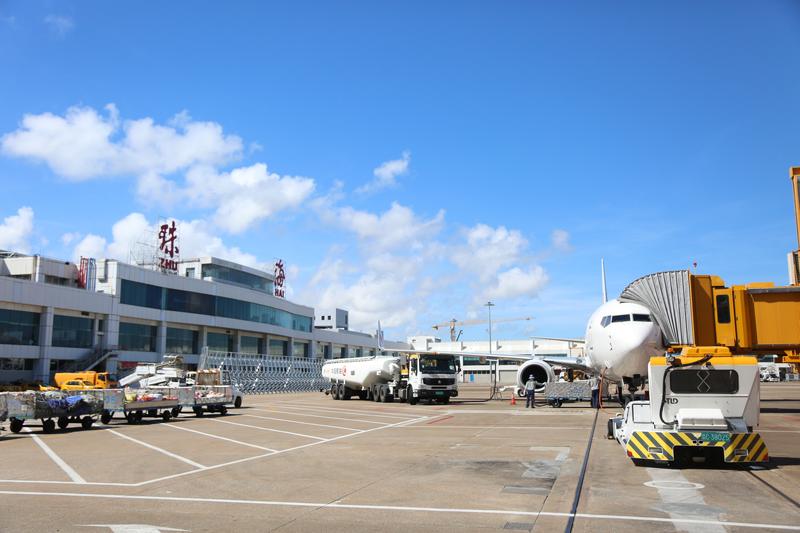Flying high over the bay


Smooth flow of goods
The close links between Hong Kong and Zhuhai in the aviation industry have a natural cornerstone: The Airport Authority Hong Kong, which operates Hong Kong International Airport, has been jointly operating and managing Zhuhai Airport under a franchise since 2006.
Two years after the Hong Kong-Zhuhai-Macao Bridge went into operation, Hong Kong Chief Executive Carrie Lam Cheng Yuet-ngor said in her 2020 Policy Address that the mega bridge will be utilized to integrate the mainland aviation network of the Zhuhai Airport with the 26 international networks of the Hong Kong International Airport, to "strengthen the competitive edge of the entire Greater Bay Area in aviation".
A year later, she announced the setting up of a high-end aviation industrial cluster in Zhuhai in collaboration with Guangdong province. The industrial park will offer aircraft maintenance engineering services, assist in the distribution of aircraft parts and components, and promote aviation industry research and training, said Albert Yau, general manager of Hong Kong-Zhuhai Airport Management Company.
In addition to basic aviation services, the industrial park will boost synergies between Zhuhai and Hong Kong in other areas such as industrial development, talent training, and resource sharing, he added.
Zhuhai Airport also intends to build a new logistics center to transport fresh food produced in Guangdong to Hong Kong and Macao or other cities covered by the airport's flight schedules, said Yau, adding it would mean more business opportunities for the region.
"We hope to see increased cooperation in the region, making us more confident in competing with overseas airlines," said Charles Lee, PwC's South China (including Hong Kong) tax leader. "If we can find a junction point among the cities in the Greater Bay Area, it's definitely good."
In return, Hong Kong could offer professional services for both travelers and enterprises across the globe, for exported or imported goods inspection under international standards, he said.
On the other side of the Pearl River, the Airport Authority Hong Kong plans to set up a logistics park in Dongguan and an airside intermodal cargo handling facility at Chek Lap Kok. The move is in response to greater demand for cross-border logistics services as cross-border electronic commerce grows amid the pandemic.
"With the new facilities in operation, customs clearance, security screening, palletization, cargo acceptance and other services for mainland exports could be done in Dongguan before the goods are shipped to the cargo handling facility in the restricted area of HKIA by sea for air transshipment to destinations worldwide," Vivian Cheung, the Airport Authority's executive director of airport operations, told China Daily.
"For imports to the mainland, the goods could be directly shipped from the HKIA restricted area to Dongguan. The procedures will comply with Hong Kong's air cargo security regulations. A pilot scheme for the operations between Hong Kong and Dongguan will be carried out," Cheung said.
The new facilities engaging mainland cities in the Greater Bay Area help Hong Kong save transport costs and the new facilities will promote the efficiency of the logistics sector if they're run well, said Lee, "It'll provide more development space for logistics companies" and offer more opportunities for Hong Kong, he added.
Such a cooperation mechanism allows Hong Kong's aviation business to play "a key dual role" in the "dual circulation" policy, Lam noted in her 2020 Policy Address. Not all cities can dream of that.
Hong Kong maintains two distinct advantages in becoming an international aviation hub, said Wong Wai-hung, an associate professor in the Department of Supply Chain and Information Management at the Hang Seng University of Hong Kong. The first is its geographical position which provides global visitors easy transit to other destinations, she said.
Located in the heart of Asia, Hong Kong is within a four-hour flight of most major Asian markets and a five-hour flight from more than half the world's population, the 2021 Policy Address noted.
The second is its "air freedom right", Wong continued. Under the framework of "one country, two systems" and the Basic Law, Hong Kong can independently negotiate and sign air services agreements with foreign aviation partners, offering great flexibility for Hong Kong to make use of its strength to provide more diversified air routes for air travelers and to expand cargo business.
These advantages have enabled Hong Kong to retain its position in the aviation industry, Wong said.
- China carries out key test on a new type of reusable carrier rocket
- PLA unit conducts nighttime drill simulating terrorist elimination
- China's light sports aircraft gains core independence with homegrown engine and avionics
- Record number of black-necked cranes arrive at Guizhou's nature reserve
- New morning and evening peak-hour trains to run between Beijing and Xiong'an
- College student rediscovers figure skating passion



































